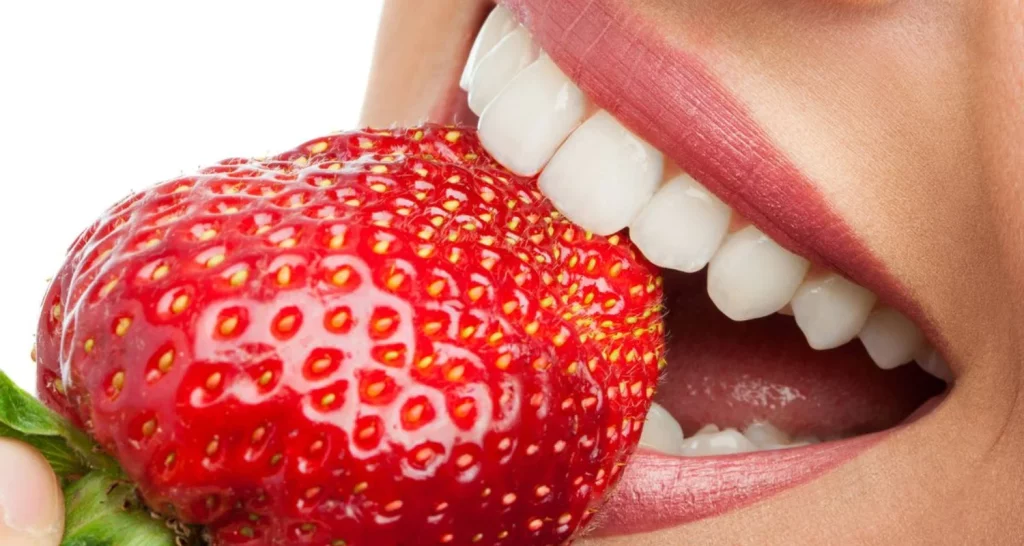Nutrition and Oral Health: A Guide to New Year’s Resolutions
The start of a new year is the perfect opportunity to set goals; one could be improving our oral health through proper nutrition. The relationship between what we eat and our oral health is intrinsic and often underestimated. This article explores how a balanced diet not only benefits our overall health but also how it can be the best ally in maintaining a healthy and new smile. Proper nutrition plays a crucial role in preventing oral diseases and strengthening the teeth and gums. Additionally, it provides suggestions for maintaining these resolutions throughout the year.
The Connection Between Nutrition and Oral Health
Every bite we put into our mouths has a direct impact on dental health. Foods rich in sugars and carbohydrates can encourage the formation of plaque, while those rich in essential nutrients will strengthen tooth enamel and fight infections. It is important to understand this connection to make dietary decisions that promote good oral health.
Nutrition plays a crucial role. The nutrients we obtain from food contribute to the fortification of the teeth and gums. For example, calcium and phosphorus are essential for the development and maintenance of strong teeth, while vitamins A, C, and D are essential for gum health and the prevention of oral diseases.
It is not only important to watch what we eat but also to understand how our body absorbs nutrients. A proper balance in the diet helps optimize the absorption of essential nutrients, while an unbalanced diet can lead to deficiencies that affect oral health, such as gingivitis or tooth decay.
Essential Nutrients for Teeth
Beneficial foods for your teeth: Fresh fruits and vegetables, especially those rich in fiber, are excellent for maintaining dental health. They act as natural cleansers and stimulate the production of saliva, which protects against cavities. Dairy products, such as cheese and yogurt, are rich in calcium and phosphorus, key elements for strengthening teeth.|
● Soccer: strengthens bones and teeth.
● Vitamin D: helps the absorption of calcium.
● Phosphor: collaborates with calcium to strengthen teeth.
● Vitamin A: essential for healthy gums.
● Vitamin C: Important for gum health.
Foods Harmful to Dental Health
Sugar is the number one enemy of dental health. Foods and drinks that are high in sugar contribute to the development of cavities. Foods high in sugars and acids are known for their negative impact on oral health. Sugar is the main culprit in developing tooth decay, as bacteria in the mouth use it to produce acids that erode tooth enamel.
Additionally, acidic foods and drinks such as soft drinks and alcohol make teeth more susceptible to cavities. Therefore, it is important to limit the consumption of these foods and maintain adequate oral hygiene to counteract their effects.
Remember:
● Sugars and carbohydrates: promote the formation of cavities.
● Acids: erode tooth enamel.
● Sticky doods: stick to the teeth, increasing the risk of cavities.
A deficiency of essential nutrients can lead to problems such as cavities, gum disease, and enamel erosion.
Tips for a Healthy Diet in Oral Health
1. Fruits and vegetables
Fresh fruits and vegetables are great for oral health. Not only do they provide essential vitamins and minerals, but they also help clean teeth and gums. Apples, carrots, and celery act as natural cleaners, removing food particles and bacteria.
These foods also stimulate the production of saliva, a key element in the fight against cavities, as it neutralize acids and help remineralize tooth enamel.
2. Dairy and alternatives
Dairy products, such as milk, cheese, and yogurt, are rich in calcium and phosphorus, elements crucial for healthy teeth. Cheese, in particular, helps neutralize acids in the mouth, reducing the risk of tooth decay.
For those who are lactose intolerant or follow a vegan diet, there are alternatives such as fortified almond milk and tofu, which can also provide these essential nutrients.
Healthy Eating Habits
Taking a balanced approach to your diet is essential for oral health. Moderating your consumption of sugars and acidic foods and including a variety of nutrients that strengthen teeth and gums is vital.
Additionally, it is important to be aware of eating habits, such as avoiding snacking between meals, which can increase the risk of cavities by constantly exposing teeth to acids.
Below we provide some recommendations and goals or objectives to maintain adequate oral health:
1. The role of hydration in oral health
Staying hydrated is essential for good oral health. Water helps wash away food particles and reduces acidity in the mouth, decreasing the risk of cavities and gum disease. On the other hand, dehydration can lead to dry mouth, a risk factor for multiple dental problems.
2. Eating habits to improve oral health
Eating at regular times and opting for healthy snacks between meals can help maintain good dental health. Avoiding constant snacking reduces the teeth’s exposure to harmful acids and bacteria. In addition, it is important to include foods that are friendly to our teeth in our diet.
3. Supplements and vitamins for oral health
Vitamins such as A, C, and D are essential for oral health. They help keep gums healthy and strengthen teeth. In some cases, supplements may be necessary to ensure adequate intake of these essential nutrients.
4. The importance of good oral hygiene
A balanced diet must be accompanied by good oral hygiene. Brushing your teeth twice a day, flossing, and making regular visits to the dentist are essential habits to maintain the health of our mouth.
5. Tips to maintain a balanced diet
Planning meals in advance can help maintain a balanced and healthy diet for our teeth. Opting for healthy alternatives and avoiding processed and sugary foods is key to good oral health.
6. How tobacco and alcohol affect your teeth
Tobacco and alcohol consumption have significant negative effects on oral health. These substances can cause stains, gum disease, and in extreme cases, oral cancer. Reducing or eliminating your consumption is crucial to maintaining a healthy mouth.
7. Stress management and oral health
Stress can have a negative impact on dental health, from causing bruxism (teeth grinding) to contributing to gum disease. Learning stress management techniques is vital to maintaining good oral health.
8. Children’s nutrition and dental health
For children, proper nutrition is essential for the development of strong, healthy teeth. Parents should encourage healthy eating habits from an early age, including a diet rich in essential nutrients and low in sugars.
How can we Implement these Long-term Strategies?
A very common challenge is to resist temptations and cravings for foods that are harmful to dental health can be difficult. Setting clear goals, planning ahead, and looking for healthy alternatives are effective strategies for overcoming these challenges.
● Meal planning: Helps maintain a balanced diet.
● Nutritional education: Learn about the benefits of certain foods for oral health.
● Consultations with professionals: Visit the dentist and nutritionist for personalized advice.
● Setting realistic goals: Small and achievable goals are best, instead of drastic changes, opt for small improvements.
● Progress record: Keep a food and dental diary.
Feeling supported and motivated is important to continue with the process, therefore it is important to keep in mind:
● Support groups: Join online or local groups, also look for a person with similar purposes.
● Achievement rewards: Reward yourself for achieving small goals, in accordance with nutritional recommendations.
● Flexibility: Adjust goals according to personal circumstances.
● Persistence: Don’t get discouraged by small setbacks.
● Include testimonials and success stories: It can be a source of inspiration and motivation. These true stories demonstrate how a change in diet and habits can have a positive impact on dental health.
Conclusion
Adopting proper nutrition and healthy habits is an excellent New Year’s resolution for improving your oral health. It is essential to understand the connection between nutrition and dental health, as well as implement eating habits that promote healthy teeth and gums. By integrating a balanced diet with good oral hygiene, we can protect our teeth and gums effectively. This holistic approach not only benefits our mouths, but also our
Frequently Asked Questions
How does diet and nutrition affect the health of teeth and gums?
The relationship between diet and oral health is direct and significant. Eating a diet poor in sugars, starches and carbohydrates can predispose one to increased vulnerability to conditions such as gum disease, tooth loss, cavities and tooth decay. In addition, a diet deficient in essential nutrients favors the increased formation of dental plaque, which generates an acid capable of deteriorating tooth enamel.
What guidelines should my diet follow for good oral health?
To promote optimal oral health, it is advisable to include in your diet foods rich in calcium and other essential nutrients, such as cheese, milk, natural yogurt with no added sugars, calcium-enriched tofu, green leafy vegetables and almonds. In addition, proteins from meat, poultry, fish, milk and eggs are important for their supply of phosphorus, a key mineral for maintaining strong teeth.
How does dental health affect nutrition in the elderly?
The absence of teeth, especially, can influence an individual’s digestive ability and nutritional status. In addition, food selection may be limited due to reduced chewing ability, leading to restricted intake of fiber- and protein-rich foods.
What is the development of teeth during infancy and early childhood?
In general, babies are born with 20 primary teeth, also called milk teeth, which begin to erupt through the gums around 6 months of age, a phenomenon known as teething. By the time a child is between 2 and 3 years old, all teeth have usually erupted.
Share:
References
1. Scardina, G. A., & Messina, P. (2012). Good oral health and diet. Journal of biomedicine & biotechnology, 2012, 720692. https://doi.org/10.1155/2012/720692
2. American Dental Association, ADA. (Aug, 2023). Nutrition and Oral Health. https://www.ada.org/resources/research/science-and-research-institute/oral-health-topics/nutrition-and-oral-health
3. WebMD. (Oct, 2021). Diet and Oral Health. https://www.webmd.com/oral-health/diet-oral-health
4. MouthHealthy. (n/f). Diet and Dental Health. American Dental Association, ADA.
https://www.mouthhealthy.org/all-topics-a-z/diet-and-dental-health
5. Gondivkar, S. M., Gadbail, A. R., Gondivkar, R. S., Sarode, S. C., Sarode, G. S., Patil, S., & Awan, K. H. (2019). Nutrition and oral health. Disease-a-month : DM, 65(6), 147–154. https://doi.org/10.1016/j.disamonth.2018.09.009
-
Nayibe Cubillos M. [Author]
Pharmaceutical Chemestry |Pharmaceutical Process Management | Pharmaceutical Care | Pharmaceutical Services Audit | Pharmaceutical Services Process Consulting | Content Project Manager | SEO Knowledge | Content Writer | Leadership | Scrum Master
View all posts
A healthcare writer with a solid background in pharmaceutical chemistry and a thorough understanding of Colombian regulatory processes and comprehensive sector management, she has significant experience coordinating and leading multidisciplina...


















